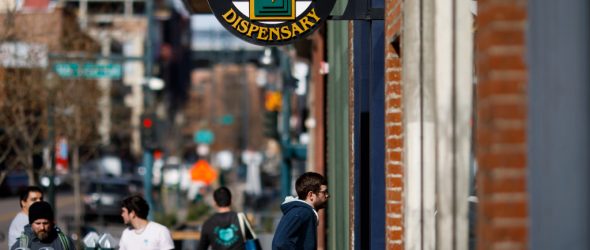As the coronavirus pandemic disrupts daily life and commerce in Colorado, many in the state’s marijuana industry believe it makes the case for allowing dispensaries to begin delivering to customers’ homes now.
Legislators legalized cannabis delivery with the passage of House Bill 1234 in 2019. The law permits medical marijuana deliveries to start in 2020 followed by recreational cannabis deliveries in 2021, but left it to municipalities to individually decide if they will allow the services.
So far just one dispensary in Colorado, The Dandelion in Boulder, has obtained a license to deliver products to patients. Shannon Gray, communications specialist for the Marijuana Enforcement Division, declined to comment on whether the timeline for recreational delivery is being reconsidered in light of the pandemic.
Advocates believe delivery should be adopted more quickly and rolled out more widely, especially during a crisis. Colorado considers marijuana dispensaries “critical” retail businesses, meaning they’re allowed to stay open, with some restrictions, under the state’s stay-at-home order.
“Whether it be a pandemic, whether it be a natural disaster, there’s always people who can’t get to the store,” said Ben Prater, manager of Cannabis Station by Rocky Mountain High dispensary in Denver. “Now that (Gov.) Jared Polis is in office, he should definitely make moves to make delivery a thing sooner than later.”
Peter Marcus, communications director for Terrapin Care Station, agrees. While teams at the company’s six dispensaries throughout the Front Range are confident in social distancing practices and curbside pickup to mitigate the spread of diseases, Marcus said delivery could only bolster best safety practices.
“In a time of crisis like this, the more options to comply with a stay-at-home order all the better,” he said.
Licensing regulations have been upended in the state’s quest to stop the spread of coronavirus and COVID-19, the respiratory illness it causes, without sinking the economy. For example, dispensaries are temporarily allowed to sell recreational cannabis online for pickup, thanks to an executive order enacted by the governor. That option has proved popular among consumers looking to limit in-person interactions.
Truman Bradley, executive director of the Marijuana Industry Group, stopped short of calling for immediate action on delivery, saying he wants local governments to be prepared for a change of that magnitude.
“We just want to make sure there’s a safe and orderly rollout,” he said.
Movement on the local level doesn’t appear timely. Though Boulder allows medical delivery, officials are not considering the same allowance for recreational cannabis, said Mishawn Cook, the city’s licensing manager.
“Instead, the way that we have in a safe manner further accommodated our marijuana dispensaries, both medical and recreational, is by allowing curbside pickup,” Cook said.
Denver has yet to opt-in to offer medical delivery, but regulators are collecting data to determine if it’s a fit for the local community, Eric Escudero, director of communications for the city’s excise and licensing division, said in a statement.
“The city and county of Denver has no plans at this time to implement any emergency cannabis delivery program,” he said. If delivery does come to Denver, the city’s rollout will include a social equity component, he added.
Delivery business has been booming in states like California, where orders climbed 46% during the third week of March compared to the same time a month prior, according to e-commerce platform Jane Technologies. In the Bay Area, delivery company Sava experienced an eight-fold increase in sales over the same week.
Building a delivery program, however, requires many considerations on the part of a dispensary. Employees at the Dandelion, which expected to begin offering delivery for medical orders Friday, must drive company vehicles, each equipped with a video-monitored lockbox for product and GPS that can be tracked remotely, said Shannon Fender, director of public affairs for parent company Native Roots.
Drivers are expected to verify identification, medical card status and the address at each patient’s home while also processing payment. The Dandelion is encouraging customers to pay with debit cards instead of cash to limit the amount of money delivery drivers carry, she said.
“It would be great to allow (third-party) transporters to begin working with stores to provide the infrastructure for delivery,” Fender said. “By law, transporters may not begin delivery until 2021 when recreational delivery comes online.”
Still, she’s hopeful more jurisdictions will opt-in soon because of demand from residents. Native Roots, which operates 21 dispensaries across Colorado, surveyed its patients and found more than 90% support delivery.
“In current times we are ensuring social distancing in our medical stores which remain open, and this option will further allow people to stay home and reduce the number of trips they have to make outside their homes for essential products,” Fender said.


